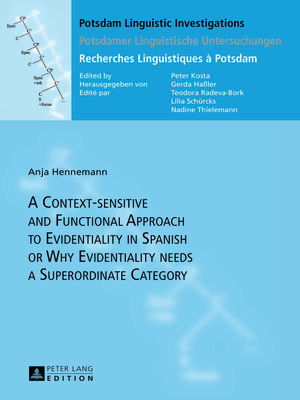A Context-sensitive and Functional Approach to Evidentiality in Spanish or Why Evidentiality needs a Superordinate Category
ebook ∣ Potsdam Linguistic Investigations / Potsdamer Linguistische Untersuchungen / Recherches Linguistiques à Potsdam
By Gerda Hassler

Sign up to save your library
With an OverDrive account, you can save your favorite libraries for at-a-glance information about availability. Find out more about OverDrive accounts.
Find this title in Libby, the library reading app by OverDrive.



Search for a digital library with this title
Title found at these libraries:
| Library Name | Distance |
|---|---|
| Loading... |
This study adopts a context-sensitive and functional approach to the qualitative analysis of Spanish linguistic means that are used to convey evidential meanings. Verbs of cognitive attitude, modal adverbs, modal verbs, the Spanish conditional and the synthetic future are analysed against the background of pragmatics. GlossaNet, a search engine that supports the researcher to build a corpus, was used to collect the examples analysed in this study. Furthermore, as evidentiality is – at least in Spanish – a linguistic category that overlaps with other semantic-functional categories, namely epistemic modality, deixis, subjectivity and polyphony, it is argued that the superordinate category speaker's perspectivisation should be imposed on these categories.







